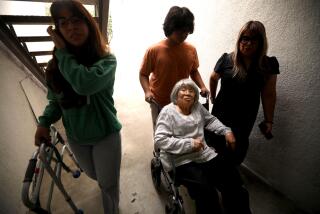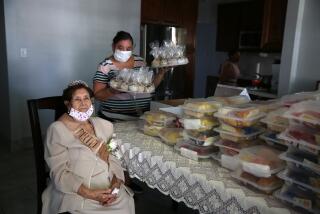How to orchestrate a harmonious family reunion
- Share via
George Morgan, the author of “Your Family Reunion: How to Plan It, Organize It and Enjoy It” and Linda Jones, a travel agent with Lauragen’s Travel in Mission Viejo, offered these pointers for anyone planning a family reunion.
Q: What kind of advice would you give to a reunion planner?
Morgan: Don’t try to do it by yourself. If you can enlist the help of other people not only will you find it’s less stressful and more rewarding but [also] you will find you will build relationships. You will get to know the people you didn’t know well before. You may develop a strong, lifelong friendship that nothing can shatter. It’s an important process to do that. The other piece [of not doing it all yourself] is that you will get buy-in from other members of the family. They will talk it up. They are your best PR.
Jones: The group also needs to realize that there’s a chance [that] not everyone is going to get exactly what they want. Therefore, there are times when the group representative needs to make the best decision he or she can, based on what is known about the group, and then stick with it. Don’t let one or two opinions make the entire trip planning process a nightmare.
Q: What are some different kinds of family reunions?
Morgan: After 9/11, there has been an increased interest in all types of family reunions, ranging from the backyard barbecue to large families getting together and taking a trip.
I know of one family of 140-some that decided to do a 50th anniversary cruise for a set of parents, and it was parents, children, grandchildren and great-grandchildren all on this one ship. The cruise took them from Southern California through the Panama Canal to New York City. It was a very, very big deal. They had a fabulous time; they got to New York City, did some shows, did a lot of things with kids ... and everyone flew home from there.
You never can tell what people are interested in. I know people who go camping together and that’s their family reunion. Brothers and sisters will go off to Yellowstone and go camping. I know one family that goes to a dude ranch.
Some women in Chicago — five sisters and their mother and an aunt — go off to a spa for a long weekend. This is their family reunion. They go off every year to this same spa.
Q: What factors should you consider when choosing a family reunion location?
Jones: It’s important to consider the people who are going:
What are the age ranges? What type of activities does each family or person enjoy? (Do they like to just relax on the beach, do they need child care, do they need handicap resources, do they love exploring, do they like nightclubs, do they like water sports, do they like shopping, etc.?)
What locations would work best? (Does everyone want to go to a beach? A mountain? Europe? A cruise?) What will the weather be like when you would like to go? (Is it hurricane season? Is it going to be too hot and muggy for Great-Aunt Matilda?)
How far will the families with the smallest children and oldest grandparents need to travel? (Have you chosen a location that puts them on a plane for 12 hours with two layovers? This might not work for these families, whereas something closer or easier to get to would be best.)
What is everyone’s budget? (You need to consider the finances of the struggling family of five just as much as wealthy Uncle John, who demands everyone stay at the Ritz.)
Q: Who pays for the meals and the rooms?
Jones: This depends on the family or group. Oftentimes each family will pay [its] own way, while other groups have a wealthy grandparent or parent [who] either pays the entire thing or at least helps. Depending on where they are, the group might share meals. (So this family pays for dinner, another pays for breakfast, etc.) Or they could choose an all-inclusive resort or cruise so meals, drinks, entertainment aren’t an issue.
Q: Do you get a discount at a hotel or resort if you book a large group?
Jones: Yes. There are several companies that encourage groups and will give better rates, more incentives, free trips for the group representative and so much more. For the group representative (the one in charge of making decisions for the entire family) and the travel agent, using a company like this makes the entire process much easier and smoother. In addition, these companies have thought of everything — how to coordinate arrivals and departures from all over the world, how to get wheelchair access for Aunt Matilda, where can child care be found, transportation to and from the resort and more.
Q: How structured should the reunion be?
Morgan: Typically most reunion planners will put together something that looks like an itinerary: “Here’s our agenda for the weekend, and these are the things that were suggested and of interest to everyone... but you are not bound to participate in any or all of these.” You have to have something for everyone. If they don’t like what is offered, offer something else.
The seniors, in many cases, are not going to be able to go hiking. The little kids are going to lose interest in the older people who are talking about Great-Grandma.
Q: What about your own reunion experiences?
Morgan: In our family we started out about 27 years ago with about 20 people. We’re up to about 160 now. We do this every fall on a farm that’s been in the family since the 1740s in North Carolina. It’s a wonderful place with a huge pond so the kids go out and go fishing. We usually do this in September just before the weather begins to turn cold. We’ll really come together Friday night and stay until Monday, and we’ll go visit the family cemetery, we’ll go shopping, we’ll go to movies.
For kids, we do something special: story time and dress-up. One thing we love to do is have the kids pretend “I’m my own grandma or grandpa,” and tell about that ancestor. All the teenagers stay in one family’s home. They’ll do a big video night with pizza and popcorn and snacks. That to them is a great way to spend time together; it’s a good, wholesome thing. Grown-ups join in too.
We’ve taken old photos and baby photos, and made a display and ... a contest: Can you ID everyone listed on the board? You have a sheet where you try to identify who is this person; we do a little prize.
Another thing we’ve done is show and tell. Maybe you bring an artifact or quilt or something that belonged to parents or grandparents, or a family Bible. For a short time people look (they can’t necessarily touch), and you get to see some of these things. We had somebody who had a handmade [woodworking] plane — the ancestor was a carpenter in the 1770s or 1780s — and one of the sons shows how it works. Kids get a kick out of that. It’s nice to bring these things out and share them. I might not know a third cousin has possession of this. It’s nice to see [that it] still exists and learn more about the story of it.
Q: Any other final tips?
Morgan: Name tags are essential. You may not have seen someone for 20 or 30 years.
More to Read
Sign up for The Wild
We’ll help you find the best places to hike, bike and run, as well as the perfect silent spots for meditation and yoga.
You may occasionally receive promotional content from the Los Angeles Times.






